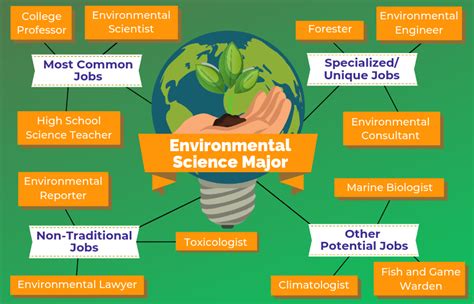Environmental science is a broad field that encompasses the study of the environment and its interaction with humans. It draws on a variety of disciplines, including biology, chemistry, physics, and geology, to understand the complex interactions between natural and human systems. With an environmental science degree, you will be equipped with the knowledge and skills to address a wide range of environmental issues, including climate change, pollution, and natural resource management.

Career Opportunities in Environmental Science
There are many different career opportunities available to those with an environmental science degree. Some of the most common include:
- Environmental Consultant: Help businesses and organizations comply with environmental regulations and reduce their environmental impact.
- Environmental Engineer: Design and implement solutions to environmental problems, such as water pollution control and waste management.
- Environmental Scientist: Conduct research on environmental issues and develop policies to protect the environment.
- Natural Resources Manager: Manage natural resources, such as forests, water, and wildlife, to ensure their sustainable use.
- Policy Analyst: Develop and implement environmental policies for government agencies and non-profit organizations.
- Teacher: Teach environmental science at the K-12 or college level.
Salaries and Job Outlook for Environmental Scientists
The median annual salary for environmental scientists is $69,260, according to the U.S. Bureau of Labor Statistics (BLS). The lowest 10 percent of environmental scientists earn less than $40,000, while the highest 10 percent earn more than $111,410.
The BLS projects that employment of environmental scientists will grow by 8 percent from 2019 to 2029, faster than the average for all occupations. This growth is expected to be driven by increasing demand for environmental protection and conservation services.
Skills and Knowledge for Environmental Scientists
In addition to a strong foundation in science and mathematics, environmental scientists need to have a number of other skills and knowledge, including:
- Communication skills: Environmental scientists need to be able to communicate their findings to a variety of audiences, including scientists, policymakers, and the general public.
- Critical thinking skills: Environmental scientists need to be able to think critically about environmental issues and develop solutions to complex problems.
- Problem-solving skills: Environmental scientists need to be able to identify and solve environmental problems, often in collaboration with others.
- Teamwork skills: Environmental scientists often work in teams with other scientists, engineers, and policymakers to address environmental issues.
- Knowledge of environmental regulations: Environmental scientists need to be familiar with the environmental regulations that govern their work.
How to Get an Environmental Science Degree
There are many different colleges and universities that offer environmental science degree programs. Most programs require students to complete coursework in biology, chemistry, physics, and geology, as well as environmental science courses. Some programs also offer specialized tracks, such as environmental engineering or environmental policy.
If you are interested in pursuing an environmental science degree, you should first research the different programs that are available. Once you have found a program that you are interested in, you should apply for admission. The admissions process typically involves submitting transcripts, letters of recommendation, and a personal statement.
Conclusion
An environmental science degree can open doors to a variety of rewarding career opportunities. With a strong understanding of the environment and its interaction with humans, you will be equipped to make a difference in the world.
Additional Resources
Frequently Asked Questions
- What are the job prospects for environmental scientists? The job outlook for environmental scientists is expected to be good over the next few years. The BLS projects that employment of environmental scientists will grow by 8 percent from 2019 to 2029.
- What are the highest paying environmental science jobs? The highest paying environmental science jobs include environmental engineers, environmental scientists, and policy analysts.
- What are the most common environmental science jobs? The most common environmental science jobs include environmental consultants, environmental engineers, and environmental scientists.
- What are the skills needed to be an environmental scientist? Environmental scientists need to have a strong foundation in science and mathematics, as well as critical thinking, problem-solving, and teamwork skills. They also need to be familiar with environmental regulations.
- How long does it take to get an environmental science degree? Most environmental science degree programs take four years to complete. However, some programs may offer accelerated tracks that allow students to complete their degree in three years.
